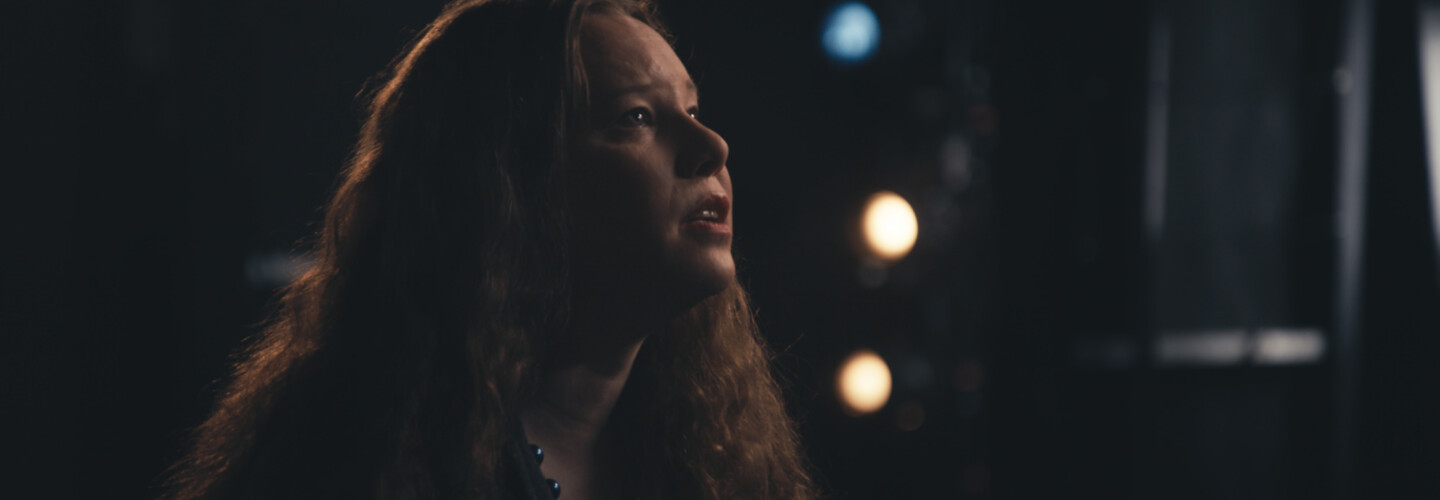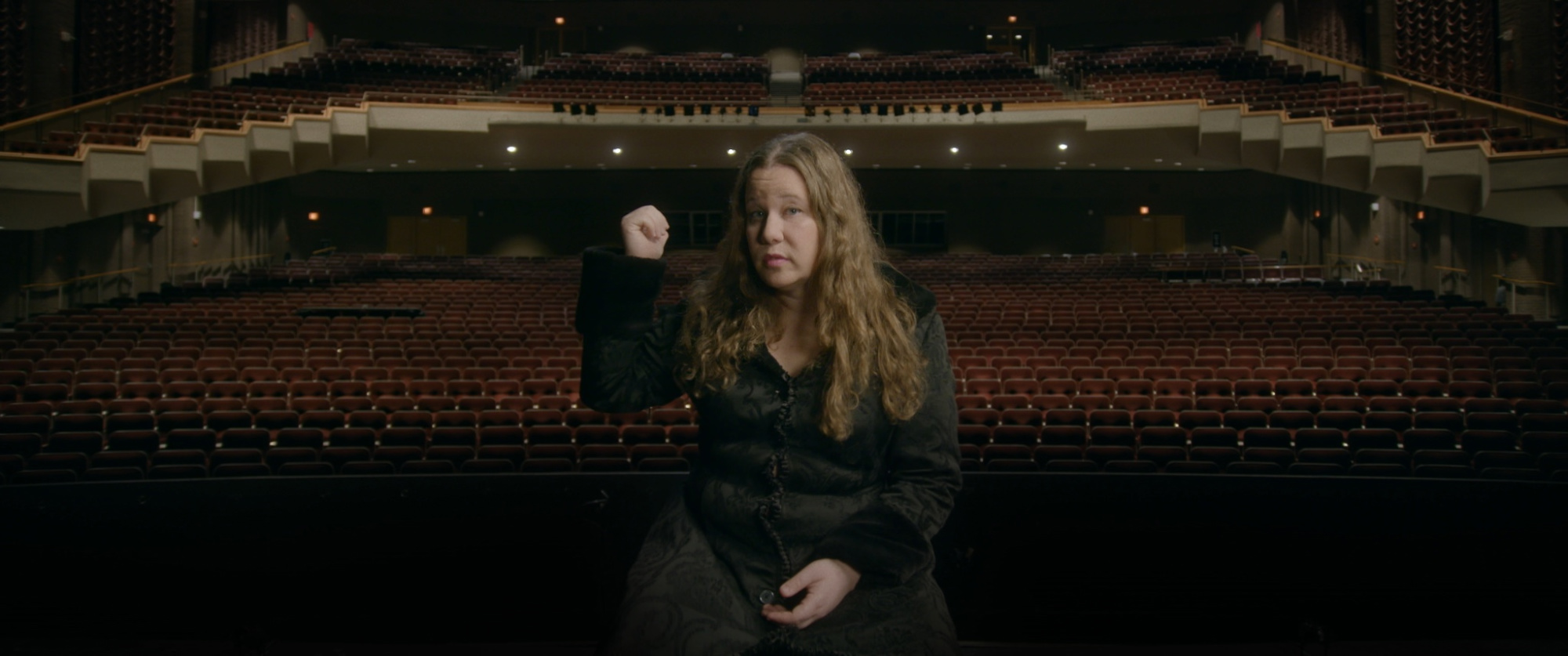
Following the behind the scene preparations for what would be a historic performance of the Tulsa Opera, James Kicklighter (who last joined us with Atlanta Journal doc Digital Edition) shadows baritone opera singer Lucia Lucas as she takes on the lead role of Don Giovanni – the first time in the U.S. that a transgender woman has performed the role in a professional opera. The resulting documentary feature The Sound of Identity intimately explores the creative process through identity in our personal and professional lives and asks us to question the continued existence of archaic social barriers. We spoke to Kicklighter about quickly orientating himself in the ways of the operatic world while meeting the responsibility filmmakers have to evolve the depiction of transgender individuals on screen.
The Sound of Identity is a gift of a story for a documentary filmmaker yet one that clearly required a deep connection between filmmaker and subject. How did your relationship with Lucia develop to the point that made this possible?
You’re absolutely right, the film was a gift given to me from Producers Russ Kirkpatrick, Andrew Kinslow and Joshua Bachove. Every gift has strings, though, and mine was that we had 3 weeks before filming to figure everything out. As you can imagine, that isn’t much prep time for a story of this scale, so our team had to dive right into it. The first order of business was to establish trust between myself and Lucia Lucas. To accomplish that goal, I had several Skype conversations with Lucia between Germany and Los Angeles. This allowed Lucia to set some ground rules and gave me the opportunity to lay out some of my vision.
For example, while Lucia was giving me full access to her process, she had already begun rehearsing the first act of Don Giovanni. Knowing that she would be on camera, it was important that she knew the material and was hitting the right notes. Her entire livelihood is dependent upon her voice, so filmic material that didn’t portray her skills accurately could be damaging to her career. I understood that, as I certainly wouldn’t want critics watching rough cuts of my films. It is truly the same concept.
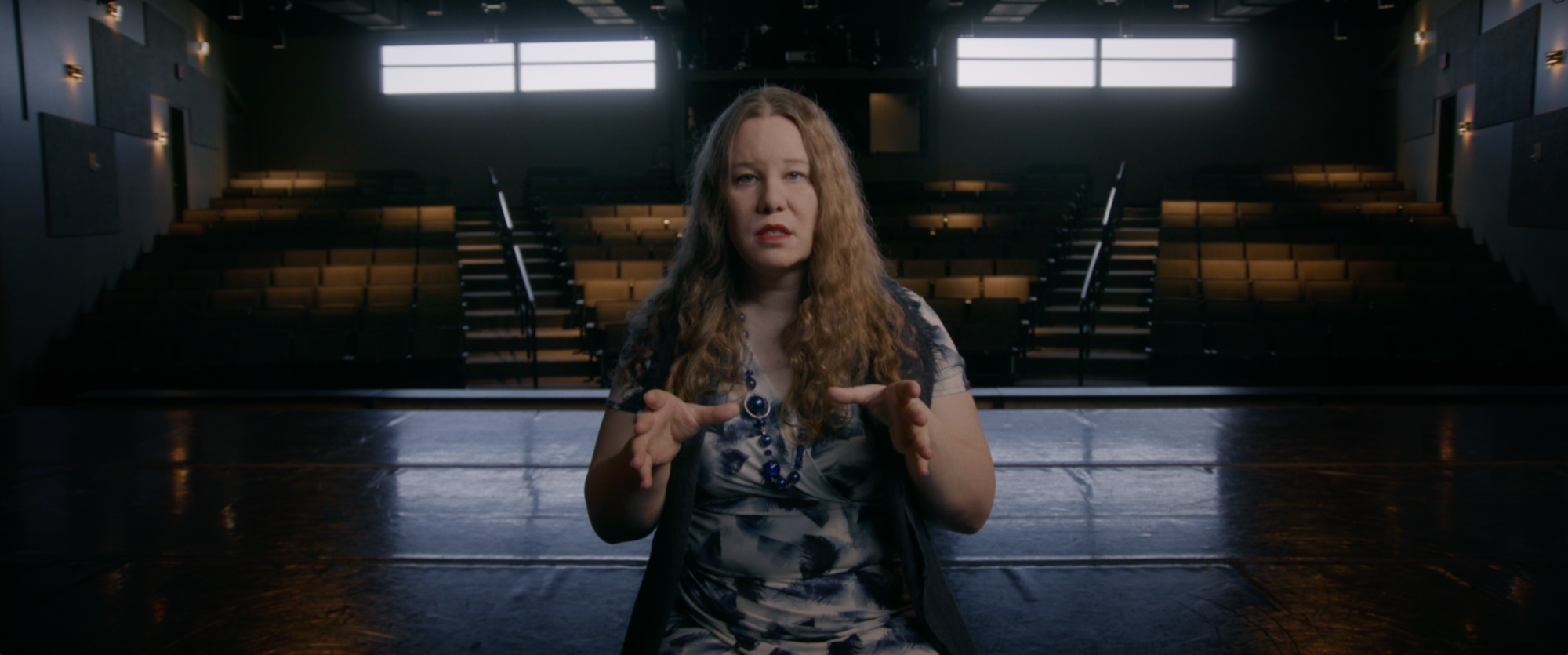
Simultaneously, I didn’t tell her the totality of my vision for the film. Striking a consistent theme is very important to me in my work because every subplot within your narrative feeds back into that overarching message. I find that if you tell a performer what that theme or message may be, consciously or subconsciously, they will bend their performance to it. It doesn’t matter if you are doing a scripted or documentary work. It is important to keep them focused, driving in their lane, while I pull the big string. Otherwise, each of those narrative threads won’t come together in the end.
Every subplot within your narrative feeds back into that overarching message.
So what did I choose to tell Lucia? I said that I would be skipping right past the topic of transition in the film. We wouldn’t discuss how that happened, and I wouldn’t show any photographs or video that conveyed a message of ‘before’ and ‘after’. In doing so, I felt that we were pushing the bounds of most films about the transgender experience.
The trope of transition is almost synonymous with the genre, an expectation of the audience. It is time that we as filmmakers move past it and tell more complete stories. Through making that choice, it also gave Lucia permission to be who she is right now, and not be worried about how she arrived there. In giving her that small piece of crucial information, Lucia knew my intentions, even though she didn’t know where it would lead. As a director, that’s what you have to do to gain trust, but also maintain objectivity between you and your talent.
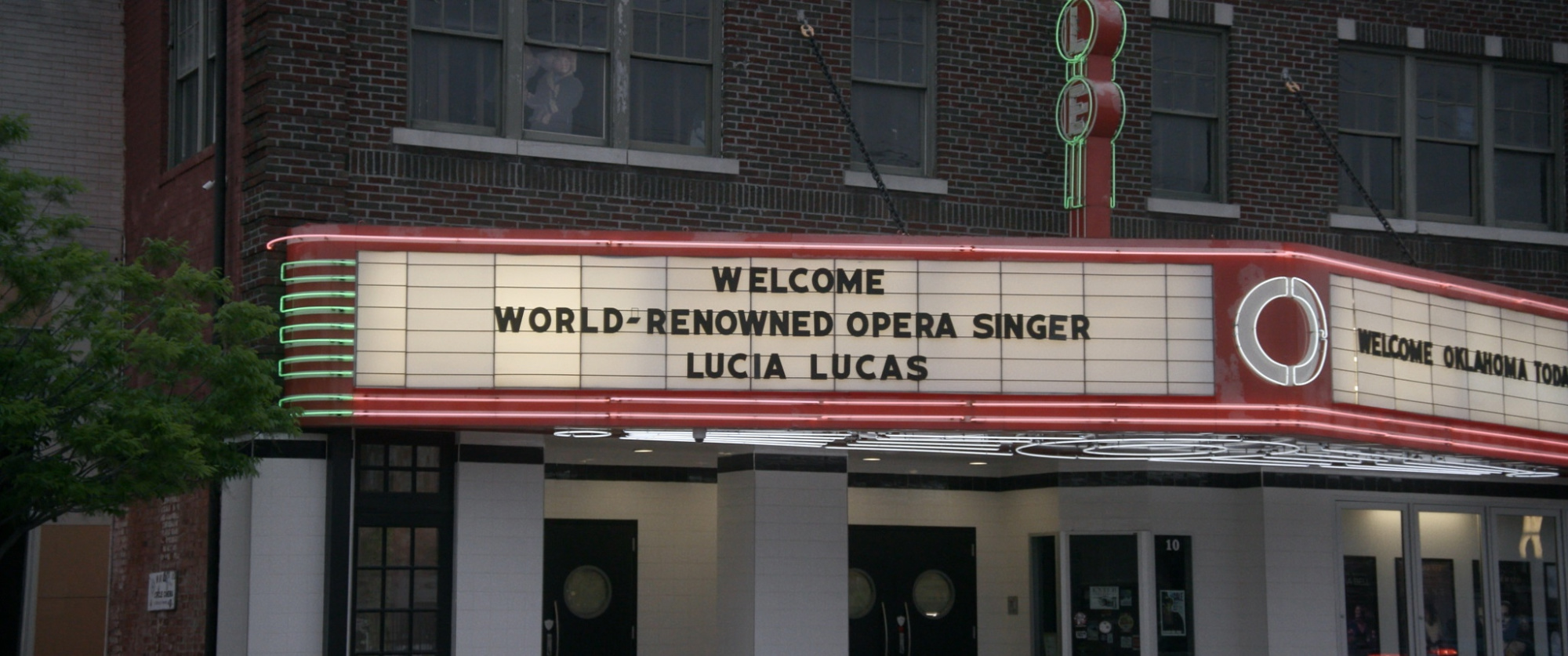
There are a lot of potential areas of narrative exploration just from the headline fact of a transgender woman being cast as the extremely toxic male character Don Giovanni. How did you define the directions you wanted to pursue in the film?
In the era of #MeToo and Harvey Weinstein, I felt this was a bold choice from director Denni Sayers and artistic director Tobias Picker. To make that more complex, they had Lucia switching between genders throughout the performance. When you think of that through the lens of 20th century stereotypes about LGBTQ people being predators and sexual deviants, it is even more astonishing. There are layers to all of this and so it was really important directorially to consider each of them. In the film, we do explore these ideas and what they mean in the context of identity.
Lucia Lucas is not Don Giovanni, who is a sociopath who preys upon the people he can manipulate. But as a creative, you do use elements of yourself to find the character. That can be collected from your own personal identity, experiences or people that have surrounded you. Having lived both sides of gender’s societal constructs, I think that Lucia delivered a unique take on this character. In doing so, it was a collaboration between herself, Denni and Tobias.
I was much more interested in the idea of how we use that identity as a currency. In this era when we are having long overdue conversations about inclusivity, I remain curious as to what it all means. For example, should women only tell women’s stories? Does a gay director only tell LGBTQ stories?
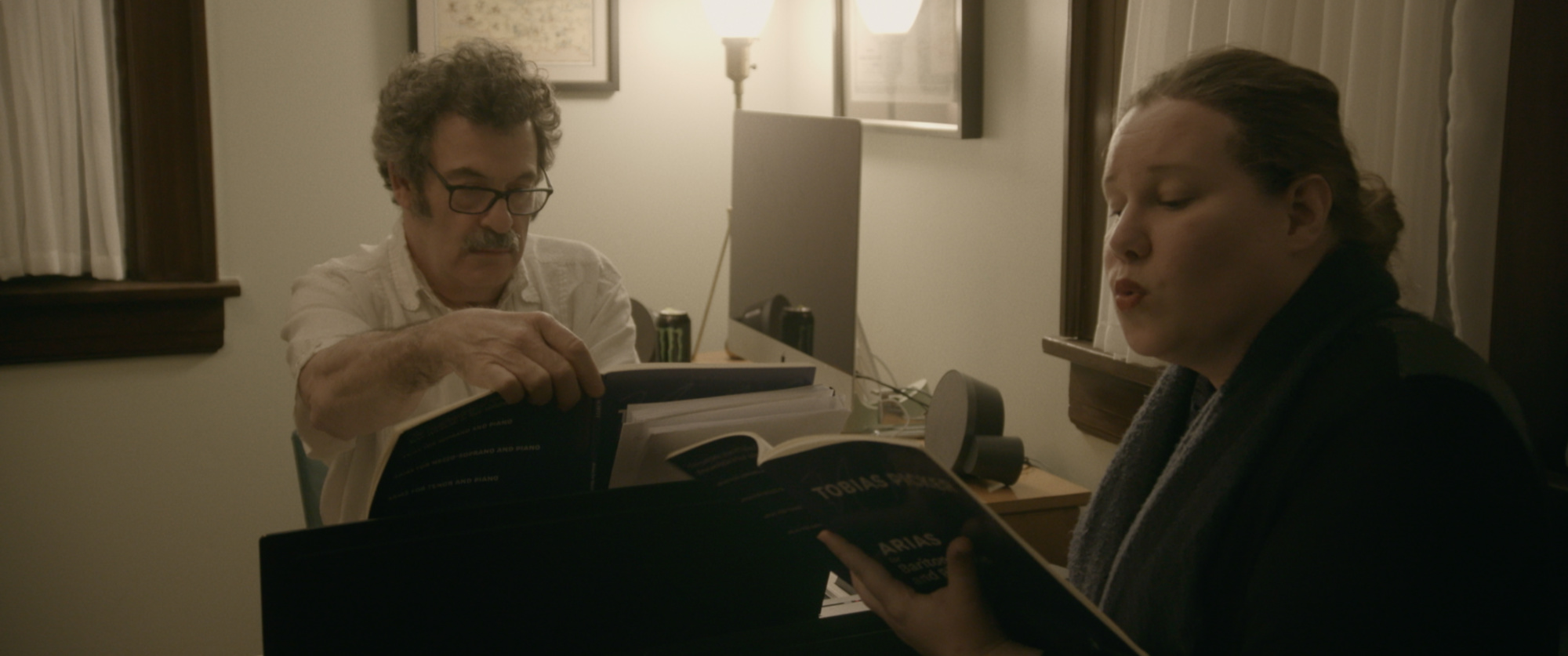
Certainly, we bring our experiences to the table if we affiliate with a specific label. I think most creatives use their personal identity to their advantage, something that Lucia and Tobias debate about through using hers in the production. I don’t have the answer to this question, and I’m not sure if there is a correct one.
I do know this — as a director, it is our job to place ourselves in the shoes of our characters, even if we don’t share their experience. To their credit, Lucia and Tulsa Opera largely gave me free rein to explore these ideas as I saw fit. But again, I think that goes back to establishing trust.
There are layers to all of this and so it was really important directorially to consider each of them.
As someone new to the world of opera how did you acclimatise yourself to that environment? Were there any surprises which reformed your initial assumptions?
Growing up in Bellville, Georgia, population 123, we didn’t have a local opera house to attend. But when my mom’s family immigrated from Europe, they toured Vaudeville like the Von Trapp Family Singers. So, I knew something about music, but my experience with opera was confined to elementary school exploratory classes. Fortunately, I was surrounded by some of the opera world’s top talent with Don Giovanni, from legendary composer Tobias Picker, conductor Andres Cladera to renowned stage director and choreographer Denni Sayers. When you get the opportunity to observe such skill, it’s hard for a curious person not to pick up something.
Of course, this was one of the surprises. Walking into it, I didn’t know that the entire cast and creative team would come from all over the world. I just assumed everyone would be from Tulsa except for Lucia. I thought that she was coming in for a guest star sort of role. I had no idea the production would be Broadway sized, and I certainly didn’t know that was a regular occurrence in Tulsa, Oklahoma.
Could you tell us more about the practicalities of your production?
My friend and director of photography, Jonathan Pope, and I go back to our first week of college at Georgia Southern University. We were in Delta Tau Delta together, became roommates, and made each other’s first student films. As friends and collaborators, we really think in lockstep after 15 years. Despite our lack of experience with opera, we felt that world was larger than life. As such, we decided to treat everything in The Sound of Identity as we would a narrative film. There would be nothing gritty or handheld. Every shot would be composed to emulate the world of opera.
As I stated earlier, we had 3 weeks to figure out how we were going to do this, creatively and technically. Producer Russ Kirkpatrick’s deep knowledge of Tulsa’s stunning locations came in handy. We scouted dozens of locations over 2 days before shooting, assigning characters to specific settings that emulated their personalities.


For Lucia, I knew she always had to be interviewed on a stage. This alluded to her historic performance, but also, the public stage of judgement that any otherized person stands upon. The stage gets bigger with every interview, representing the internal and external growth of her career. I was lucky to accomplish this, crafting my line of questioning accordingly for each of Lucia’s 3 hour interviews. In each conversation, I fashioned the questions to represent each phase of her career within the three act structure. Once we left one stage, as with our development as artists, we would never return to that stage again. In the final cut of the film, we change stages every 30 minutes for each act.
As a director, it is our job to place ourselves in the shoes of our characters, even if we don’t share their experience.
It was a 5 week filming process. We set up most of the interviews in advance, creating a shooting schedule that coordinated with the rehearsal schedule. Between those interviews, we established ‘rehearsal’, ‘scene’, and ‘b-roll’ shooting days. I felt it was essential that the film go outside of the rehearsal space to feel like a complete story, but also, treating that space with respect. After all, everything Lucia and the cast did for The Sound of Identity was in their spare time. At most, we never had more than 10 crew members on a set during interviews, limiting that to four people in rehearsals. I never wanted to take away from Tulsa Opera’s actual work.
During the final week of filming, negotiations broke down between several unions, and we were told that we could not film the actual performance. Though I had not planned for the performance to be the focus of the film, it was essential that we had it for my finale. We were able to negotiate a compromise with the Tulsa Opera, breaking up filming into three days.
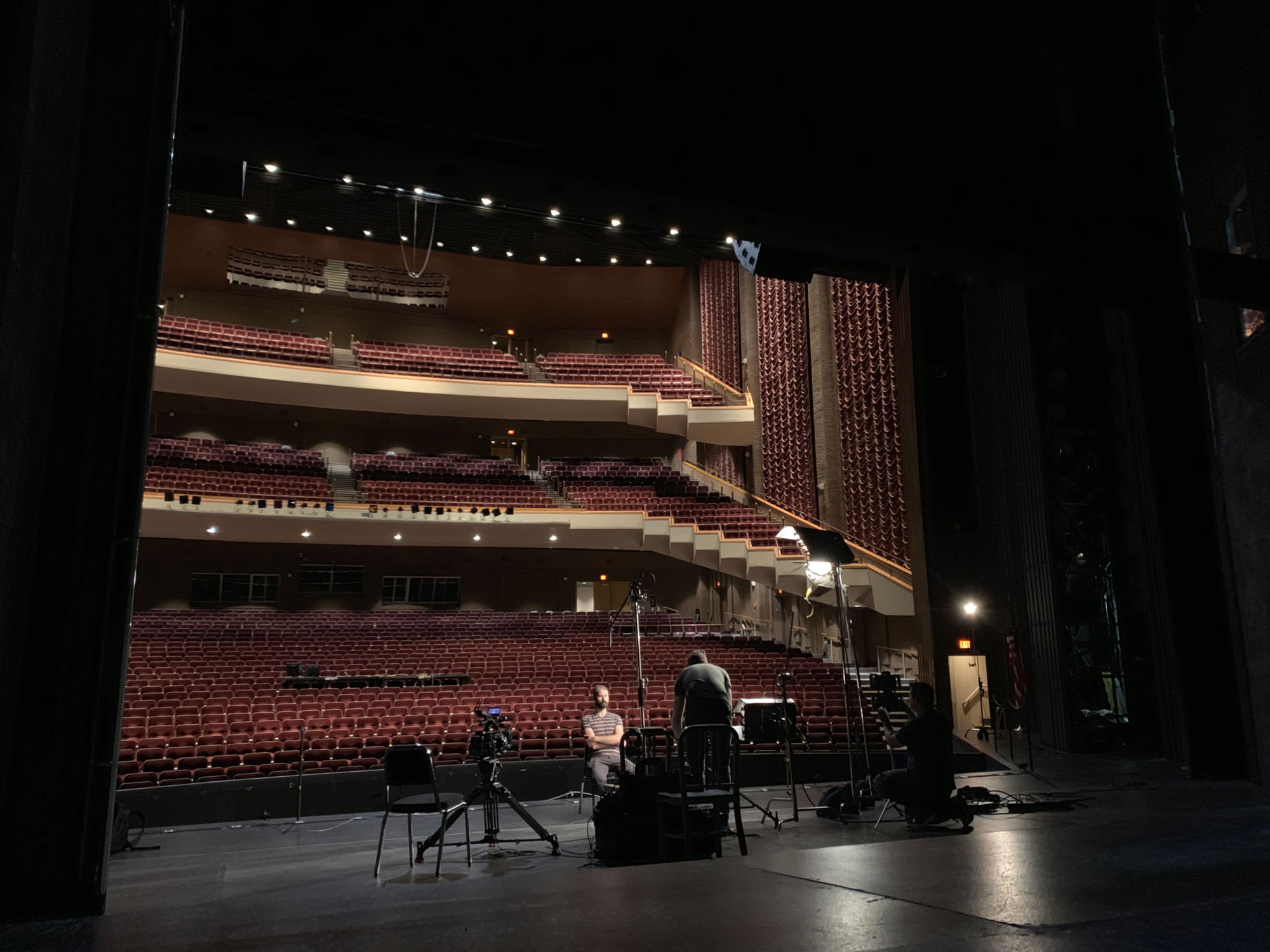



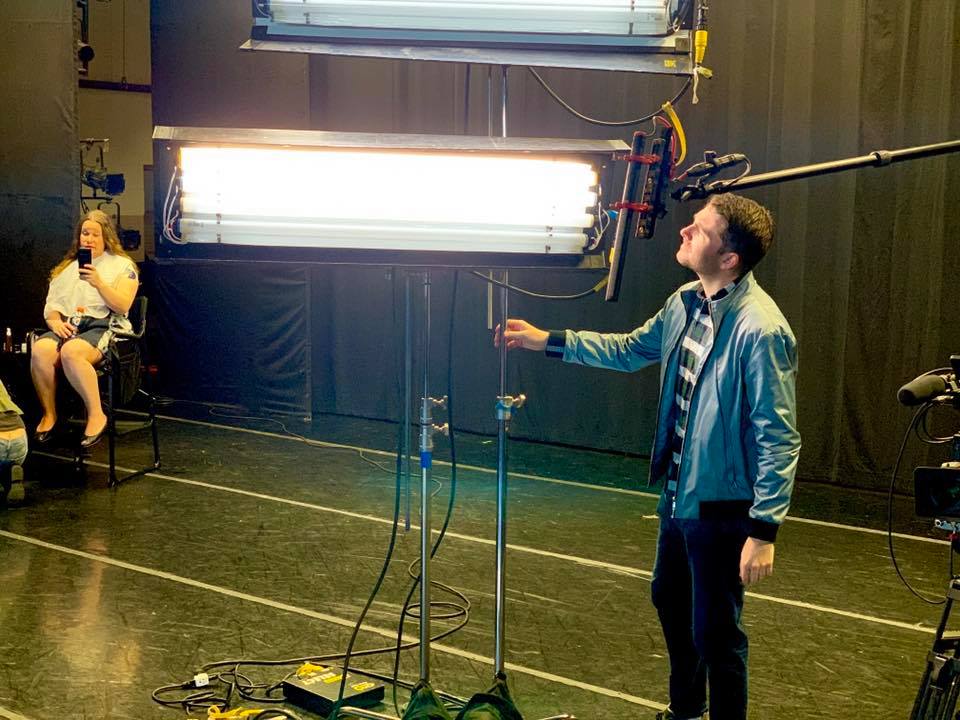

We filmed behind the scenes for the first dress rehearsal, 25 minutes of stage performance during the second, and 5 minutes from the finale of Don Giovanni on opening night. We also were able to shoot afterwards in Lucia’s dressing room, completing my planned story arc. In the film, those three days are integrated together through editing, score and sound design. I think most viewers would never know that — until they read this interview — and I am very proud that our team pulled it together.
We shot on the Canon C300 Mark II with sticks and the DJI Ronin M for Steadicam-type shots. Though we initially wanted to use some vintage Angenieux primes for stylized moments, we realized that Canon’s Cinema Zoom lenses were much more practical for our production needs. We shot all of our drone footage in 6 hours, using the DJI Inspire 2. I find often in films, people use the most generic of drone shots, where it nearly feels like stock footage. Creatively, it was important to Jon and I that the camera swooped up and down, gliding over buildings and onto specific focal points. That helped to establish a firm sense of geography, but also, maintained our cinematic visual style.
When we finished shooting, I took 5 days off and hopped straight into editing the film myself. I did that over the course of two and a half sleepless months. Afterwards, my composer of many years, Nicolas Repetto, crafted a score that used elements of Mozart from Don Giovanni but was driven by Nick’s original writing. I didn’t want to pressure Nick to improve Mozart, because that is an impossible task. In 4 weeks, Nick wrote 46 minutes of score. After approving the digital mockups, we recorded it in Hollywood with a full symphony orchestra.
Simultaneously, I was working with other members of my team, sound designer Michael Capuano and colorist Jerimiah Morey, to complete post-production. Michael designed a Dolby Digital 5.1 surround track to create an immersive experience with the voices and orchestrations. Jerimiah pulled out every color from shooting RAW 4:2:2, mastering in anamorphic, to create rich colors and a visual tapestry that matched the cinematic world of opera.
In total, the entire film was conceived and completed in 6 months.
How did the grandiose nature of opera influence the stylistic choices you made?
The locations of Tulsa really helped to create the more grandiose visuals of the film. We were very lucky to have that because Tulsa is an old oil town whose oil barons believed in beautiful architecture. Director of Photography Jonathan Pope and I felt that we would be remiss not to tap into it. Because of that interplay between setting and subject, we were able to bring Lucia’s world of opera and the city of Tulsa together.
I was making a conscious choice not to otherize Lucia, presenting her as a regular old person with an extraordinary talent.
We hear Lucia sing before we hear her speak which feels like a direct challenge to audience expectations and a clear signpost for what follows in the documentary.
I’m glad that you noticed this! It was a very intentional directorial decision. When producer Russ Kirkpatrick first pitched the idea to me, that was the first spark that lit the fuse for me. In society, whether we like to admit it or not, we assign gender attributes to individuals based on the pitch of their voice. Have you ever gotten a phone call from a stranger who misgendered you? Someone that says, “sir” or “ma’am” when they didn’t intend to do so? As most of us aren’t opera singers, I think that most of us have experienced something like that in our life. Though voice does not have a gender, society assigns gender to voice.
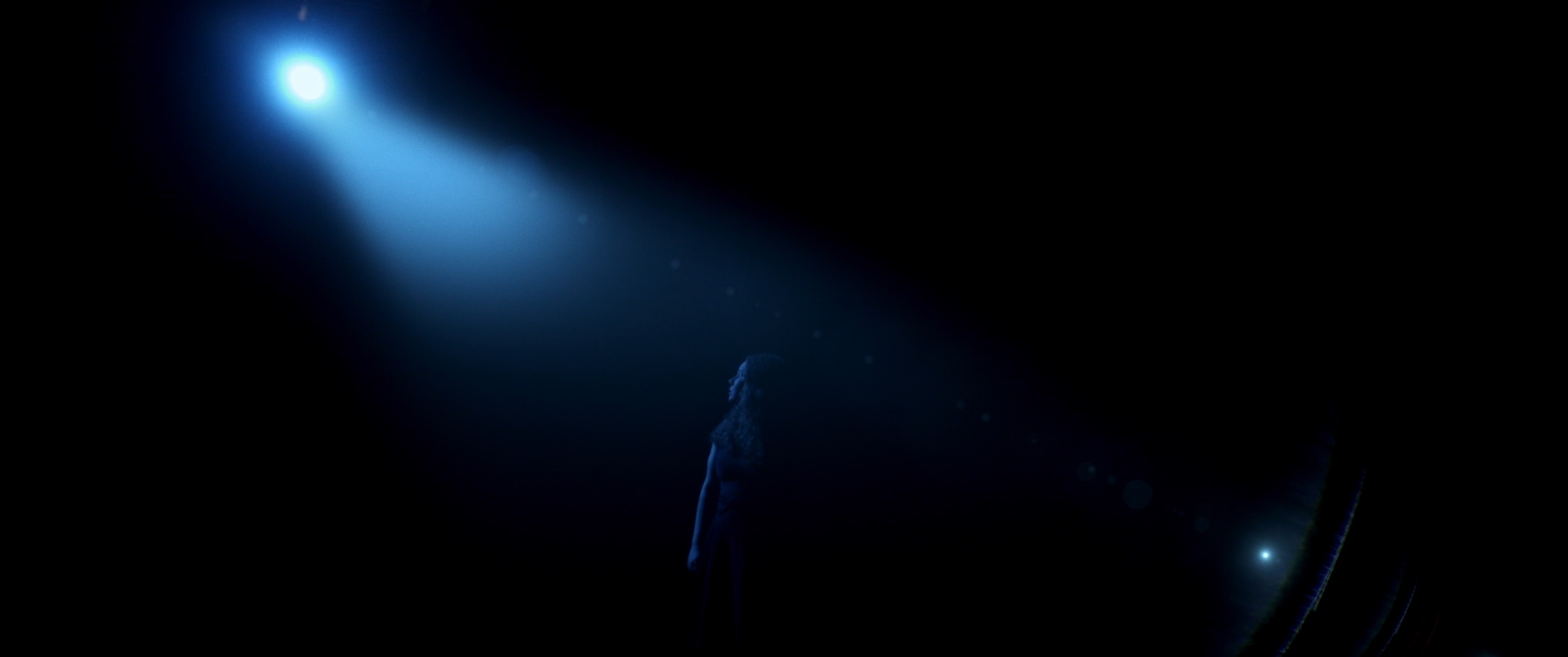
Through opening the film with Lucia’s voice — before you even see her, in fact — the viewer hopefully goes through a few mental gymnastics:
Oh, wow! That’s a big, booming baritone.
Oh, gosh! That’s not a man, it’s a woman!
Uh, huh, when she talks, she doesn’t sound like that at all?
In doing so, I wanted the viewer to challenge their own conceptions of voice, and in turn, gender identity. In skipping past the topic of transition, I was making a conscious choice not to otherize Lucia, presenting her as a regular old person with an extraordinary talent. How does Lucia being trans impact you personally? It doesn’t.
To this day, the trans community is constantly discriminated against, with high rates of suicides and murders. Though bigotry and intolerance certainly play a role, I think that representation in media is also part of the problem. If an audience’s only relationship with transgender stories is transition, then we as storytellers are actively participating in their otherizing.
I hope by the end of the film, you kind of forget that Lucia is trans. You hopefully become invested in Lucia’s talent, not her identity, while presenting a strong advocate for the trans community. To my mind, that’s how you spark social change.
I wanted the viewer to challenge their own conceptions of voice, and in turn, gender identity.
Having completed The Sound of Identity what do you feel Lucia’s story tells us about self, identity and their roles within society?
On paper, you wouldn’t expect this story to play out in Tulsa, Oklahoma, would you? Most viewers would think about this happening in New York or Berlin. That also wouldn’t make it nearly as interesting. Obviously, Tulsa is more socially conservative than those places, and that is precisely why this is important. While I’m sure there were people in Tulsa who had an issue with Lucia’s presence, I didn’t see them. There were no picket signs, no public protests. The performance didn’t sell out, but the ticket sales were solid as expected.
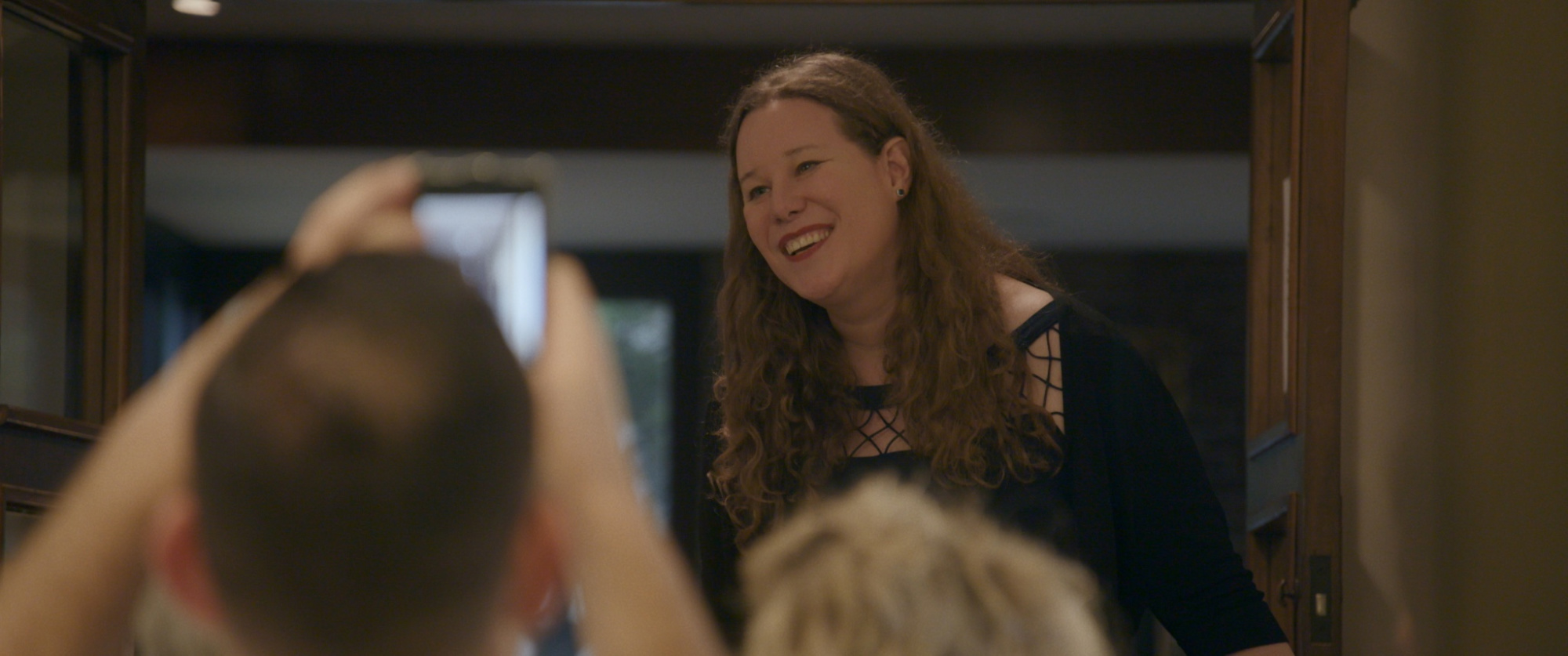
I know for a fact that Lucia changed some minds about what it meant to be a transgender person in Tulsa. After her appearance, the mayor signed an executive order adding gender identity and expression to the City of Tulsa’s employee non-discrimination policy. If we strive to build acceptance for the discriminated voices of society, we will not do it through singing to the choir in our liberal enclaves. We’ve got to present people as humans, not sideshows, in places that may not otherwise be exposed to different ideas.
Society is formed by a vast array of people striving for their own piece of freedom in the world. Right now, you see a lot of selfish backlash occurring, citizens that think granting rights to others is taking away from their rights and power. As evidenced by our story, that’s not what happens.
When we build a more inclusive world, we hear different ideas from different experiences that are not our own. I think that scares people who think their way of life is the only way of life. We can’t blame them for not being exposed to anything else. If we have a microphone, as I am so lucky to have, we have the opportunity to amplify different ideas about self, identity and society.
If we as storytellers do it right, then we can help shape that more perfect union.
Are you working on anything new at the moment?
I am currently in post-production on The American Question, which has been shooting over 4 years in Pennsylvania, Michigan, New York, Boston, Washington, D.C. and Israel. The documentary examines how American value systems are formed in communities, following subjects from the aftermath of the 2016 election to early 2020.
We were fortunate to get experts in history, government and culture like Amy Chua (Day of Empire), Colin Woodard (American Nations), and Yascha Mounk (The People vs. Democracy) to participate in the film. The film is massive in scope, so keep your fingers crossed that I can pull it off.
Pending on the passing of COVID-19, I plan to come back around to a scripted film from my Angel of Anywhere writers, The Perpetual State of Georgia. It’s a delightful coming of age story for 30-somethings. We have had to delay it several times for scheduling reasons, but I’m optimistic that we can get it done in 2021.
I feel very lucky to have such a diversity of projects to keep me busy. This is what you dream about when you first become a director, you know?

